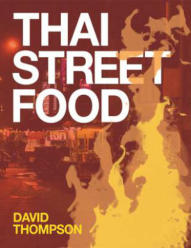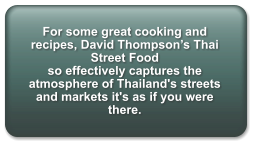
Thai Food
Thai food is extremely popular all over the world due to its aromatic quality and use of fresh ingredients which can be cooked easily in a relatively short time. The essence of Thai cooking is to obtain a balance of taste; sweet, sour, salty and hot. The flavours are designed to complement one another to provide this balance. The sweet ingredients are provided by the use of palm sugar and coconut milk. Lime, rice vinegar and tamarind are the sour ingredients, whilst soy sauce, fish sauce, oyster sauce and shrimp paste give the food the essential salty taste to complement the sweet ingredients. The hot flavours are, of course, derived from the use of both red and green chilli. Galangal, a milder but peppery aromatic form of ginger is also used to provide some heat as is white pepper in the less spicy dishes. Thais tend to be great snackers and will take a snack up to six times a day. It may only be a fruit snack or some street food but it will be tasty and healthy. Food is only considered to be a meal if it is eaten with rice and shared by friends and/or family. Dishes are not served in courses but usually at one time with everyone sharing the dishes. Thai restaurants vary as sometimes the dishes will come in succession with a slight delay between, the rice coming with the first dish. A typical Thai meal will consist of a clear soup, a light aromatic fried fish, a spicy dish, a salad and rice. The host will then invite to eat rice (gin khao). Fruit will typically follow the meal and Thailand has some delicious indigenous fruits as well as the more familiar ones. Food is usually eaten with a spoon and fork as the ingredients are in bite size pieces. The fish will be served whole with head and servings are pulled from the bone by diners. It is customary to take enough food just for a few mouthfuls and then serve again. It is impolite to pile it all on the plate at one time. Traditionally Thais ate with the hands which they still do with sticky glutinous rice. A Thai royal being presented with cutlery from Europe found the knife was not required and ignored it. Hence Thais eat from the spoon whilst pushing the food onto the spoon with the fork. It is considered impolite to put a fork into the mouth, although this will be overlooked in tourist areas and in western food chains. Noodle soups are eaten with chopsticks and a spoon. If you find yourself lucky enough to dine with a Thai family at a Thai restaurant, it should be noted that the women order all the food and the most senior (status) will pay for the meal. That will be the eldest or the most affluent or a foreigner who is being given the privilege and it is considered a compliment.Thai Food Ingredients
We have a look at the key ingredients of Thai food, their preparation and storage in our ingredients section.
Thailand Genius
For Everything Thailand
Copyright © 2014-2015 ThailandGenius.com. All Rights Reserved


Buy Now
Free Worldwide Delivery



Thai Food
Thai food is extremely popular all over the world due to its aromatic quality and use of fresh ingredients which can be cooked easily in a relatively short time. The essence of Thai cooking is to obtain a balance of taste; sweet, sour, salty and hot. The flavours are designed to complement one another to provide this balance. The sweet ingredients are provided by the use of palm sugar and coconut milk. Lime, rice vinegar and tamarind are the sour ingredients, whilst soy sauce, fish sauce, oyster sauce and shrimp paste give the food the essential salty taste to complement the sweet ingredients. The hot flavours are, of course, derived from the use of both red and green chilli. Galangal, a milder but peppery aromatic form of ginger is also used to provide some heat as is white pepper in the less spicy dishes. Thais tend to be great snackers and will take a snack up to six times a day. It may only be a fruit snack or some street food but it will be tasty and healthy. Food is only considered to be a meal if it is eaten with rice and shared by friends and/or family. Dishes are not served in courses but usually at one time with everyone sharing the dishes. Thai restaurants vary as sometimes the dishes will come in succession with a slight delay between, the rice coming with the first dish. A typical Thai meal will consist of a clear soup, a light aromatic fried fish, a spicy dish, a salad and rice. The host will then invite to eat rice (gin khao). Fruit will typically follow the meal and Thailand has some delicious indigenous fruits as well as the more familiar ones. Food is usually eaten with a spoon and fork as the ingredients are in bite size pieces. The fish will be served whole with head and servings are pulled from the bone by diners. It is customary to take enough food just for a few mouthfuls and then serve again. It is impolite to pile it all on the plate at one time. Traditionally Thais ate with the hands which they still do with sticky glutinous rice. A Thai royal being presented with cutlery from Europe found the knife was not required and ignored it. Hence Thais eat from the spoon whilst pushing the food onto the spoon with the fork. It is considered impolite to put a fork into the mouth, although this will be overlooked in tourist areas and in western food chains. Noodle soups are eaten with chopsticks and a spoon. If you find yourself lucky enough to dine with a Thai family at a Thai restaurant, it should be noted that the women order all the food and the most senior (status) will pay for the meal. That will be the eldest or the most affluent or a foreigner who is being given the privilege and it is considered a compliment.Thai Food Ingredients
We have a look at the key ingredients of Thai food, their preparation and storage in our ingredients section.


- Home
- Travel
- Locations
- North Thailand
- Useful Tips
- Thai Phrases
- Thai Food
- Thai Ingredients
- Thai Food Recipes
- Thai Green Curry
- Thai Red Curry
- Oyster Chicken with Herbs
- Massaman Curry
- Sweet Chilli Chicken
- Thai Language
- Language Introduction
- Thai Flashcards
- Online Learning
- Day to Day
- Contact Us
- Privacy Policy
Thailand Genius
For Everything Thailand
Copyright © 2014-2015 ThailandGenius.com.
All Rights Reserved


Buy Now
Free Worldwide Delivery



Thai Food
Thai food is extremely popular all over the world due to its aromatic quality and use of fresh ingredients which can be cooked easily in a relatively short time. The essence of Thai cooking is to obtain a balance of taste; sweet, sour, salty and hot. The flavours are designed to complement one another to provide this balance. The sweet ingredients are provided by the use of palm sugar and coconut milk. Lime, rice vinegar and tamarind are the sour ingredients, whilst soy sauce, fish sauce, oyster sauce and shrimp paste give the food the essential salty taste to complement the sweet ingredients. The hot flavours are, of course, derived from the use of both red and green chilli. Galangal, a milder but peppery aromatic form of ginger is also used to provide some heat as is white pepper in the less spicy dishes. Thais tend to be great snackers and will take a snack up to six times a day. It may only be a fruit snack or some street food but it will be tasty and healthy. Food is only considered to be a meal if it is eaten with rice and shared by friends and/or family. Dishes are not served in courses but usually at one time with everyone sharing the dishes. Thai restaurants vary as sometimes the dishes will come in succession with a slight delay between, the rice coming with the first dish. A typical Thai meal will consist of a clear soup, a light aromatic fried fish, a spicy dish, a salad and rice. The host will then invite to eat rice (gin khao). Fruit will typically follow the meal and Thailand has some delicious indigenous fruits as well as the more familiar ones. Food is usually eaten with a spoon and fork as the ingredients are in bite size pieces. The fish will be served whole with head and servings are pulled from the bone by diners. It is customary to take enough food just for a few mouthfuls and then serve again. It is impolite to pile it all on the plate at one time. Traditionally Thais ate with the hands which they still do with sticky glutinous rice. A Thai royal being presented with cutlery from Europe found the knife was not required and ignored it. Hence Thais eat from the spoon whilst pushing the food onto the spoon with the fork. It is considered impolite to put a fork into the mouth, although this will be overlooked in tourist areas and in western food chains. Noodle soups are eaten with chopsticks and a spoon. If you find yourself lucky enough to dine with a Thai family at a Thai restaurant, it should be noted that the women order all the food and the most senior (status) will pay for the meal. That will be the eldest or the most affluent or a foreigner who is being given the privilege and it is considered a compliment.Thai Food Ingredients
We have a look at the key ingredients of Thai food, their preparation and storage in our ingredients section.
Thailand Genius
For Everything Thailand
Copyright © 2014-2015 ThailandGenius.com. All Rights Reserved


Buy Now
Free Worldwide Delivery

































